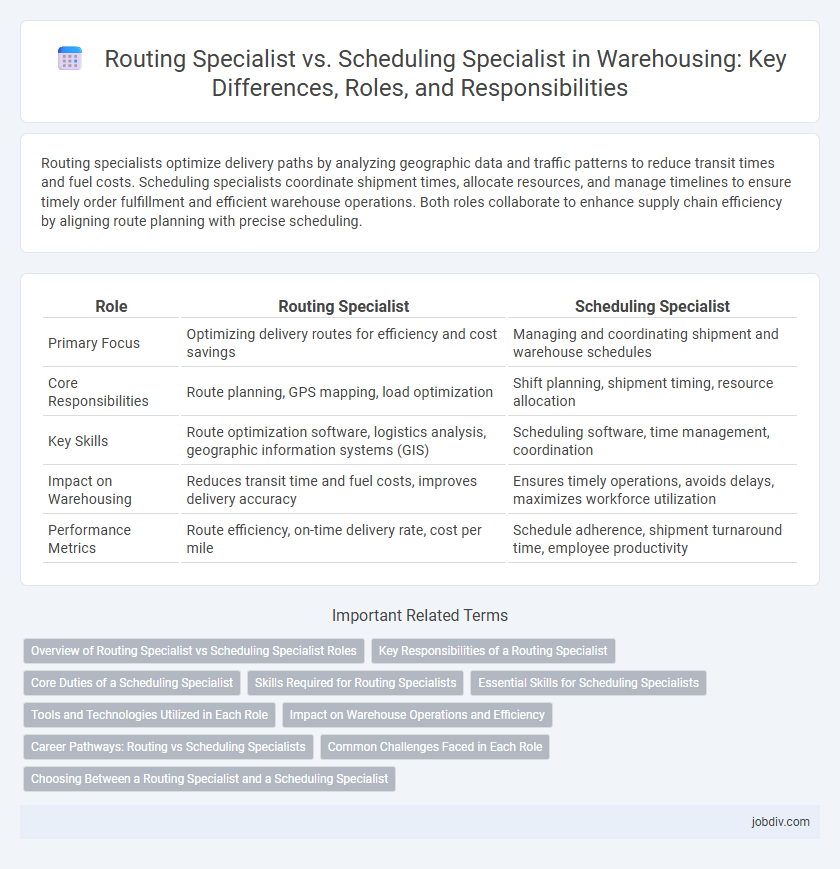Routing specialists optimize delivery paths by analyzing geographic data and traffic patterns to reduce transit times and fuel costs. Scheduling specialists coordinate shipment times, allocate resources, and manage timelines to ensure timely order fulfillment and efficient warehouse operations. Both roles collaborate to enhance supply chain efficiency by aligning route planning with precise scheduling.
Table of Comparison
| Role | Routing Specialist | Scheduling Specialist |
|---|---|---|
| Primary Focus | Optimizing delivery routes for efficiency and cost savings | Managing and coordinating shipment and warehouse schedules |
| Core Responsibilities | Route planning, GPS mapping, load optimization | Shift planning, shipment timing, resource allocation |
| Key Skills | Route optimization software, logistics analysis, geographic information systems (GIS) | Scheduling software, time management, coordination |
| Impact on Warehousing | Reduces transit time and fuel costs, improves delivery accuracy | Ensures timely operations, avoids delays, maximizes workforce utilization |
| Performance Metrics | Route efficiency, on-time delivery rate, cost per mile | Schedule adherence, shipment turnaround time, employee productivity |
Overview of Routing Specialist vs Scheduling Specialist Roles
Routing Specialists analyze delivery routes to optimize transportation efficiency, reduce fuel costs, and improve customer satisfaction by ensuring timely deliveries. Scheduling Specialists coordinate and manage workforce shifts, production timelines, and equipment usage to maintain smooth warehouse operations and meet demand deadlines. Both roles are critical in supply chain management, with Routing Specialists focusing on logistics paths and Scheduling Specialists emphasizing resource allocation.
Key Responsibilities of a Routing Specialist
Routing Specialists optimize delivery routes by analyzing geographic data and traffic patterns to enhance efficiency and reduce transportation costs. They coordinate with drivers and dispatch teams to ensure timely pickups and drop-offs while adhering to regulatory compliance and safety standards. Their role involves real-time route adjustments and leveraging routing software to improve overall warehouse distribution workflows.
Core Duties of a Scheduling Specialist
Scheduling Specialists in warehousing focus on planning and coordinating inbound and outbound shipments to ensure timely delivery and optimal resource utilization. They develop detailed schedules for loading, unloading, and inventory management, minimizing downtime and preventing bottlenecks. Their expertise in aligning workforce shifts with operational demands enhances overall warehouse efficiency and productivity.
Skills Required for Routing Specialists
Routing specialists require strong analytical skills to optimize delivery routes, ensuring efficient use of transportation resources while minimizing costs and transit times. Proficiency in geographic information systems (GIS) and route optimization software such as ArcGIS or Route4Me is essential for planning and adjusting logistics routes. Effective communication and problem-solving abilities enable routing specialists to coordinate with drivers, warehouse teams, and dispatchers to address delays and reroute shipments promptly.
Essential Skills for Scheduling Specialists
Scheduling Specialists excel in time management, ensuring optimal allocation of warehouse resources and precise coordination of inbound and outbound shipments. Mastery of scheduling software and data analysis equips them to forecast demand accurately and prevent bottlenecks. Strong communication skills enable seamless collaboration with routing specialists, drivers, and warehouse teams to maintain efficient operations.
Tools and Technologies Utilized in Each Role
Routing Specialists leverage advanced Geographic Information Systems (GIS), route optimization software such as Route4Me and Descartes, and GPS tracking technologies to design efficient delivery paths and reduce transit times. Scheduling Specialists utilize enterprise resource planning (ERP) systems like SAP and Oracle, workforce management software, and demand forecasting tools to coordinate labor shifts, equipment usage, and shipment timetables precisely. Both roles integrate warehouse management systems (WMS) for real-time data but apply distinct technological solutions tailored to route planning versus operational scheduling.
Impact on Warehouse Operations and Efficiency
Routing Specialists optimize the path and sequence of deliveries, reducing transportation costs and improving on-time shipments, which directly enhances warehouse throughput and inventory turnover. Scheduling Specialists manage the timing of inbound and outbound activities, ensuring dock availability and minimizing wait times, leading to smoother workflow and reduced labor bottlenecks. Together, these roles increase overall warehouse efficiency by synchronizing transport logistics with operational capacity.
Career Pathways: Routing vs Scheduling Specialists
Routing specialists develop expertise in optimizing delivery routes using geographic information systems and logistics software, leading to advanced roles in transportation planning and fleet management. Scheduling specialists focus on coordinating warehouse operations and resource allocation, progressing toward roles in operations management and supply chain coordination. Both career pathways offer opportunities to enhance efficiency and contribute to seamless distribution networks within warehousing environments.
Common Challenges Faced in Each Role
Routing Specialists often encounter challenges related to optimizing delivery routes amid fluctuating traffic conditions and regulatory constraints, which impact timely shipments and fuel efficiency. Scheduling Specialists face difficulties managing workforce availability and coordinating shipment timetables to prevent bottlenecks and ensure smooth warehouse operations. Both roles require precise communication and real-time data updates to minimize delays and maintain supply chain continuity.
Choosing Between a Routing Specialist and a Scheduling Specialist
Choosing between a Routing Specialist and a Scheduling Specialist in warehousing depends on operational priorities; Routing Specialists optimize delivery paths using GPS and traffic data to reduce fuel costs and improve transit times, while Scheduling Specialists coordinate warehouse tasks and workforce allocation to maximize efficiency and meet deadlines. Businesses with complex delivery networks benefit more from Routing Specialists, whereas facilities facing variable labor needs and tight production schedules rely heavily on Scheduling Specialists. Analyzing workflow complexity and key performance indicators like on-time delivery rate and labor utilization helps determine the ideal specialist for warehouse optimization.
Routing Specialist vs Scheduling Specialist Infographic

 jobdiv.com
jobdiv.com